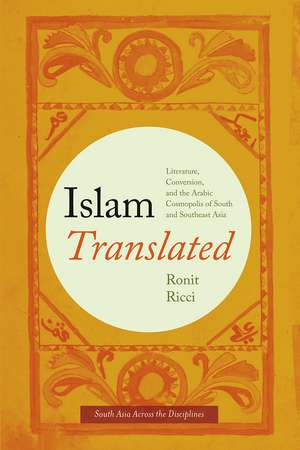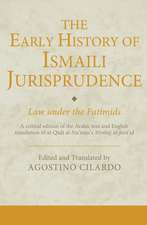Islam Translated: Literature, Conversion, and the Arabic Cosmopolis of South and Southeast Asia: South Asia Across the Disciplines
Autor Ronit Riccien Limba Engleză Paperback – 31 mar 2016
The spread of Islam eastward into South and Southeast Asia was one of the most significant cultural shifts in world history. As it expanded into these regions, Islam was received by cultures vastly different from those in the Middle East, incorporating them into a diverse global community that stretched from India to the Philippines.
In Islam Translated, Ronit Ricci uses the Book of One Thousand Questions—from its Arabic original to its adaptations into the Javanese, Malay, and Tamil languages between the sixteenth and twentieth centuries—as a means to consider connections that linked Muslims across divides of distance and culture. Examining the circulation of this Islamic text and its varied literary forms, Ricci explores how processes of literary translation and religious conversion were historically interconnected forms of globalization, mutually dependent, and creatively reformulated within societies making the transition to Islam.
In Islam Translated, Ronit Ricci uses the Book of One Thousand Questions—from its Arabic original to its adaptations into the Javanese, Malay, and Tamil languages between the sixteenth and twentieth centuries—as a means to consider connections that linked Muslims across divides of distance and culture. Examining the circulation of this Islamic text and its varied literary forms, Ricci explores how processes of literary translation and religious conversion were historically interconnected forms of globalization, mutually dependent, and creatively reformulated within societies making the transition to Islam.
Din seria South Asia Across the Disciplines
-
 Preț: 224.82 lei
Preț: 224.82 lei -
 Preț: 188.21 lei
Preț: 188.21 lei -
 Preț: 251.31 lei
Preț: 251.31 lei -
 Preț: 277.16 lei
Preț: 277.16 lei -
 Preț: 278.09 lei
Preț: 278.09 lei - 23%
 Preț: 515.90 lei
Preț: 515.90 lei -
 Preț: 252.50 lei
Preț: 252.50 lei -
 Preț: 298.67 lei
Preț: 298.67 lei -
 Preț: 276.57 lei
Preț: 276.57 lei -
 Preț: 466.27 lei
Preț: 466.27 lei -
 Preț: 543.92 lei
Preț: 543.92 lei -
 Preț: 282.32 lei
Preț: 282.32 lei -
 Preț: 274.66 lei
Preț: 274.66 lei -
 Preț: 272.54 lei
Preț: 272.54 lei -
 Preț: 278.09 lei
Preț: 278.09 lei -
 Preț: 314.03 lei
Preț: 314.03 lei -
 Preț: 267.26 lei
Preț: 267.26 lei -
 Preț: 272.54 lei
Preț: 272.54 lei - 23%
 Preț: 480.07 lei
Preț: 480.07 lei -
 Preț: 230.67 lei
Preț: 230.67 lei -
 Preț: 314.03 lei
Preț: 314.03 lei -
 Preț: 255.38 lei
Preț: 255.38 lei -
 Preț: 272.32 lei
Preț: 272.32 lei -
 Preț: 249.62 lei
Preț: 249.62 lei -
 Preț: 269.17 lei
Preț: 269.17 lei -
 Preț: 313.45 lei
Preț: 313.45 lei -
 Preț: 286.81 lei
Preț: 286.81 lei -
 Preț: 507.95 lei
Preț: 507.95 lei -
 Preț: 251.53 lei
Preț: 251.53 lei - 23%
 Preț: 447.94 lei
Preț: 447.94 lei - 14%
 Preț: 457.16 lei
Preț: 457.16 lei - 19%
 Preț: 161.18 lei
Preț: 161.18 lei - 16%
 Preț: 547.59 lei
Preț: 547.59 lei - 19%
 Preț: 148.93 lei
Preț: 148.93 lei - 17%
 Preț: 153.36 lei
Preț: 153.36 lei - 14%
 Preț: 355.26 lei
Preț: 355.26 lei - 17%
 Preț: 335.27 lei
Preț: 335.27 lei - 22%
 Preț: 480.63 lei
Preț: 480.63 lei
Preț: 255.18 lei
Nou
Puncte Express: 383
Preț estimativ în valută:
48.83€ • 51.11$ • 40.64£
48.83€ • 51.11$ • 40.64£
Carte tipărită la comandă
Livrare economică 31 martie-14 aprilie
Preluare comenzi: 021 569.72.76
Specificații
ISBN-13: 9780226380537
ISBN-10: 022638053X
Pagini: 335
Ilustrații: 4 halftones, 3 line drawings
Dimensiuni: 152 x 229 x 23 mm
Greutate: 0.45 kg
Editura: University of Chicago Press
Colecția University of Chicago Press
Seria South Asia Across the Disciplines
ISBN-10: 022638053X
Pagini: 335
Ilustrații: 4 halftones, 3 line drawings
Dimensiuni: 152 x 229 x 23 mm
Greutate: 0.45 kg
Editura: University of Chicago Press
Colecția University of Chicago Press
Seria South Asia Across the Disciplines
Notă biografică
Ronit Ricci is associate professor in the School of Culture, History, and Language at the Australian National University.
Cuprins
List of Illustrations
Preface
Acknowledgments
List of Abbreviations
1 Introduction: An Arabic Cosmopolis?
Part One: Translation
2 On “Translation” and Its Untranslatability
3 The Book of Samud: A Javanese Literary Tradition
4 The Tamil Āyira Macalā: Questions and Marvels
5 Seribu Masalah: The Malay Book of One Thousand Questions
Part Two: Conversion
6 Cosmopolitan in Translation: Arabic’s Distant Travels
7 Conversion to Islam and the Book of One Thousand Questions
8 A Jew on Java, a Model Malay Rabbi, and a Tamil Torah Scholar: Representations of Abdullah Ibnu Salam and the Prophet in the Book of One Thousand Questions
Part Three: Conclusion
9 The Arabic Cosmopolis of South and Southeast Asia
Bibliography
Index
Preface
Acknowledgments
List of Abbreviations
1 Introduction: An Arabic Cosmopolis?
Part One: Translation
2 On “Translation” and Its Untranslatability
3 The Book of Samud: A Javanese Literary Tradition
4 The Tamil Āyira Macalā: Questions and Marvels
5 Seribu Masalah: The Malay Book of One Thousand Questions
Part Two: Conversion
6 Cosmopolitan in Translation: Arabic’s Distant Travels
7 Conversion to Islam and the Book of One Thousand Questions
8 A Jew on Java, a Model Malay Rabbi, and a Tamil Torah Scholar: Representations of Abdullah Ibnu Salam and the Prophet in the Book of One Thousand Questions
Part Three: Conclusion
9 The Arabic Cosmopolis of South and Southeast Asia
Bibliography
Index
Recenzii
“Ronit Ricci has succeeded in writing a book that combines scrupulous examination of textual shifts, concepts, imagery, and genre with a tremendously persuasive argument and a stimulating reading of the differences in translation process between languages and cultures. This book helps us to understand the differing ways in which Arabic and Arabic writings moved into other literatures and takes readers through a rich and detailed journey of imagery and language. This is a fascinating book that will appeal widely to anyone concerned with translation in its historical and cultural contexts.”
“This is a trail-blazing study about the dynamics of writing within the Arabic cosmopolis around the Indian Ocean, a topic that awaits further explorations. Ronit Ricci’s tantalizing close readings of particular versions of the Book of One Thousand Questions show an impressive knowledge and again and again open it up to new views. Islam Translated breathes enthusiasm and pleasure.”
“Islam Translated is a remarkable achievement, at once theoretically sophisticated and grounded in tremendously impressive archival research. Grappling with questions fundamental to the humanities, this book promises to serve as a model for future scholarship in area studies and comparative literature.”
“This volume makes a significant contribution to the study of the intersections of language, faith, and culture.”
“Straddling history and literary theory, this book is a linguistic tour de force, as the author moves effortlessly between Javanese, Malay, Tamil, Arabic, and Hebrew texts. . . . An extraordinary rich and seductive tale of cross-cultural communication and miscommunication.”
“A salutary corrective both to ideas of indigenous or Southeast Asian ‘uniqueness’ and of derivative Arabization, this splendid book should be widely read.”
“An inspiring combination of breathtaking scholarship and humane vision.”
“This book succeeds in establishing the importance of literary networks in the spread of Islam. In addition, it provides insights into a range of issues pertaining to a larger literature on questions and answers found across religions traditions, the question of religious authorities, memories of an Islamic past, a lived Islamic present, and shifting cosmopolitanisms—to name a few.”
“A book of extraordinary scholarship and ambitious scope.”
“Ronit Ricci’s book is an ambitious, erudite, and accessible work aimed at reformulating our understanding of the language, literature, history, and religion of much of maritime Asia. . . . [It] stands as a landmark in the scholarship on Islam in South and Southeast Asia.”
“Ricci is a gifted reader of texts with a remarkable feel for language, an eye for detail and a superb felicity of expression. . . . Islam Translated communicates to its readers a lively sense of the tremendous creative energy that animated the Islamic textual communities of South and Southeast Asia, and provides a sophisticated framework for understanding the culture-specific practice of translation.”
“An excellent new book.”
“Deftly argued and neatly written. . . . Although we have a few studies concerned with non-Sanskrit languages and literature, they too mostly focus on non-Islamic writing. Studies on Islamic literary materials remain unexplored. Undoubtedly, Ricci’s book fills this void while successfully analyzing an Islamic narrative that blends local and global Islamic cultural and social aspects.”
“This is a wonderful book and one to take time over. It brings us into the heart of the process of the formation of Islamic pesisir culture. While dense in detail, it is cogently and elegantly argued and Ricci’s linguistic range is astounding.”
“Ronit Ricci presents a novel and innovative approach to the momentous transformations occasioned by the Islamisation of this vast region. . . . Ricci’s presentation of her findings is lucid and convincing, and the many translated passages allow the reader glimpses of the style and character of the texts under consideration. Besides looking at Javanese, Malay, and Tamil texts, she also draws on sources in languages as diverse as Arabic, Latin, and Hebrew. . . . Ricci’s excellent and innovative study should be compulsory reading for anyone interested in the spread of Islam beyond Arabia and serve as a starting point in reconsidering the role of vernacular literatures in the processes of Islamisation across Asia.”
“The questions Ricci raises in her excavations of Javanese, Malay, and Tamil texts will enliven Asian and Islamic literary studies and embolden scholars to pursue global questions on local terms and through local archives for generations to come.”
“A pathbreaking book. . . . Ricci has substantially widened the field of Southeast Asian literary and cultural studies, the comparative study of South and Southeast Asia connections, and our understanding of the processes through which Islam entered the spheres of India, Malaysia, and Indonesia.”
“Islam Translated is a valuable addition to the study of literary production, Islamization, and translation history, and offers us much to think about and think through. No doubt it will spur additional explorations of the Arabic cosmopolis.”
“Ricci approaches her body of related texts with clear instrumentality, using them as far as possible to answer the deeper questions that drive her inquiry, questions related to the cultural workings of the Arabic Cosmopolis. . . . These highly textured discussions and reflexions present a range of questions, arguments, conclusions and musings that invite productive response and debate.”
“Fascinating and innovative. . . . As a study of religion and literature this book yields terrific new insights and demands new approaches to the perennial questions of great/little or cosmopolitan/vernacular cultural dynamics. . . . It is a fantastic, conversation-starting work that sets a new standard for what we can aspire to in Asian studies.”
“This analysis of the Tamil, Javanese, and Malay versions of the Book of One Thousand Questions is a very welcome addition to the already rich literature on translation in Asia.”
“Ricci not only offers rich insight for translation studies scholars who are interested in the interface between translation and religion, but also brings home to scholars studying religions that investigation of translation conceptions and practices of faith communities can fruitfully extend our understanding of how religious traditions and identities are articulated.”
“A significant piece of scholarship on the role of language and literary networks in the spread of Islam and the interplay between the vernacular and cosmopolitan.”










